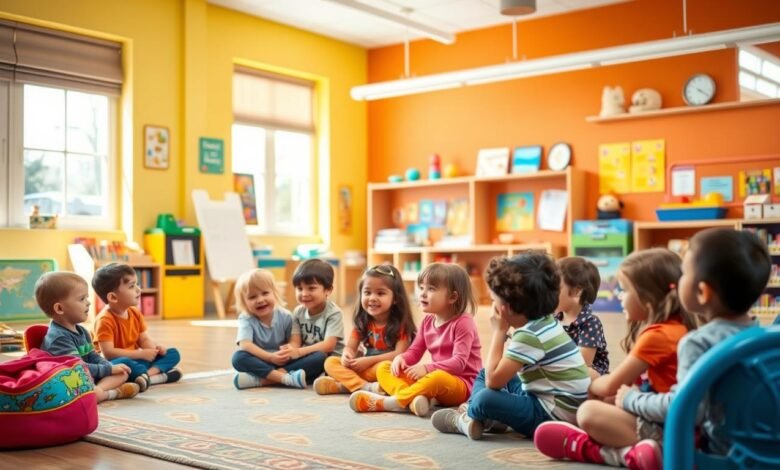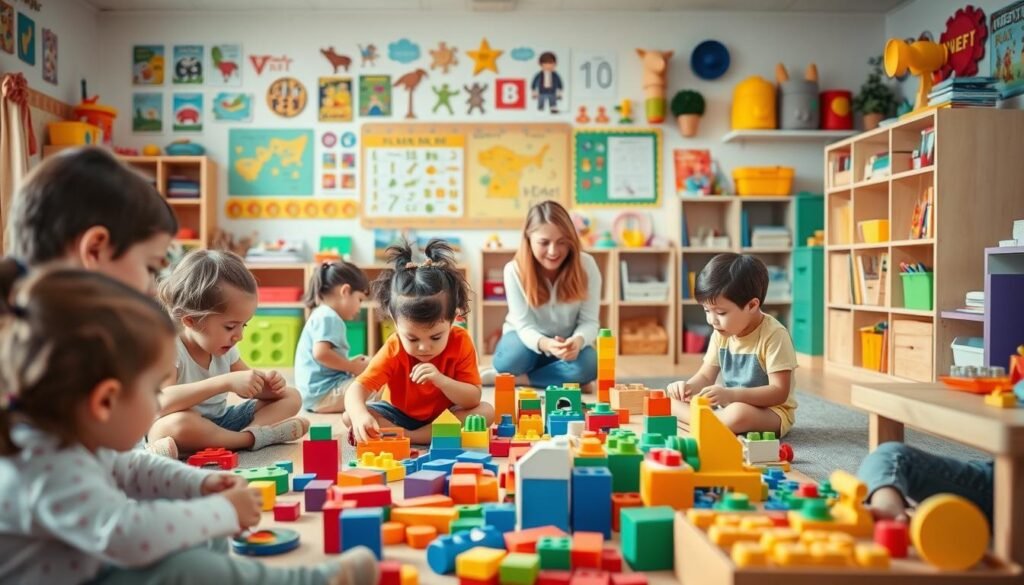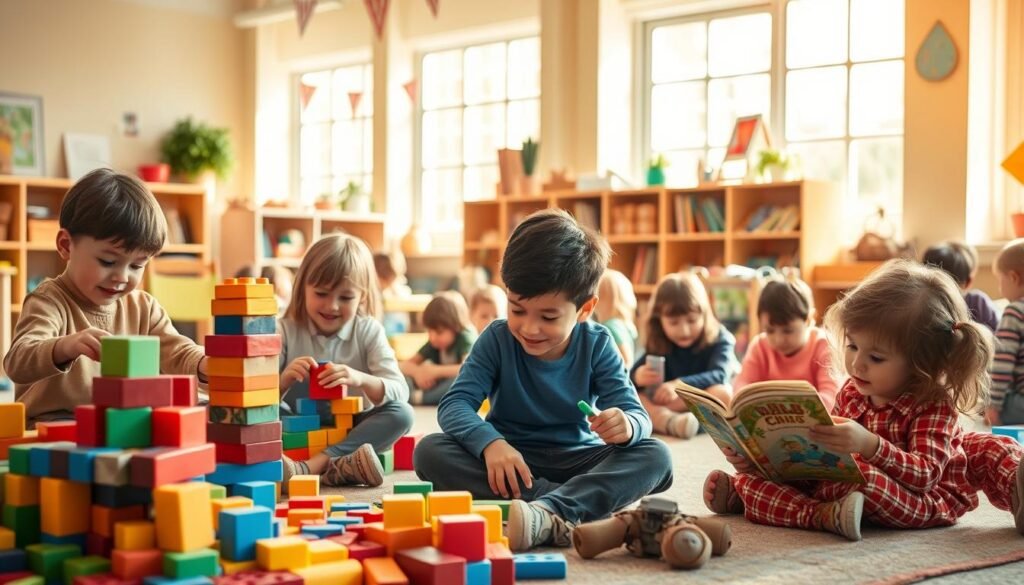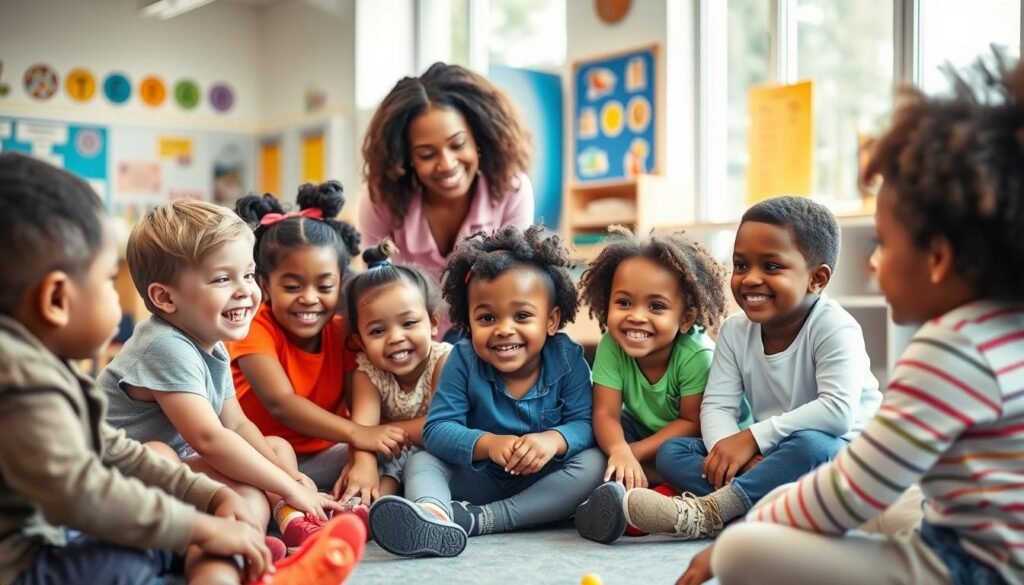Your Guide to Thriving in Early Childhood Education

Imagine creating a space where young children can grow, explore, and learn. As an early childhood educator, you shape the minds and hearts of tomorrow’s leaders. With 75% of leaders struggling to balance work and education, your support is key. We’re here to guide you in this vital field, focusing on early childhood education, preschool curriculum, and child development.
Picture yourself laying a strong foundation for children’s success. You’ll use the latest research and best practices in early childhood education. You’ll learn to manage budgets, build strong teams, and more. All while focusing on your students’ and families’ needs and staying current with child development and preschool curriculum trends.
Starting this journey, you’ll see how early childhood education sets the stage for lifelong learning. You’ll dive into child development, including cognitive and social-emotional growth. You’ll also learn about the role of family and community in student success, all within a well-designed preschool curriculum. So, how can you thrive in early childhood education and make a real difference in your students’ lives?
Understanding Early Childhood Education Essentials
Exploring early childhood education reveals its key role in shaping your child’s future. Kindergarten readiness is a big step, and parents play a big part in it. Knowing the basics of early childhood education helps you support your child’s growth.
Studies show that quality early education boosts school readiness by 20%. Kids in good programs do 15% better in school than those without. This shows why early learning strategies that meet your child’s needs are so important.
Early education prepares your child for kindergarten and sets them up for future success. Parent involvement makes education 25% better. Remember, every child is different, and they grow at their own pace.
Benefits of Early Childhood Education
When thinking about your child’s education, it’s key to know the early childhood education benefits. Studies show that kids in top early education programs do better in school later on. This is because early education sets the stage for learning, including 
Play-based learning is a big part of early education. It helps kids love learning, solve problems, and be creative. By using play-based learning, you can give your child a strong start in school. Early education is vital because it prepares kids for a lifetime of learning.
Early education also helps with social and emotional skills. Kids in great early education programs have better social and emotional skills. They also do well with their friends and teachers. This can lead to success in school and a strong learning foundation for the future.
Different Approaches to Early Childhood Education
When looking for your child’s education, you’ll find many early childhood education approaches. Each has its own set of principles and practices. Knowing these can help you choose the best for your child’s growth.
The Montessori Method is a popular choice. It focuses on learning, social skills, physical, and emotional growth. It lets kids learn at their own pace. The Reggio Emilia Approach, on the other hand, encourages kids to express themselves and explore their surroundings. It sees the classroom as a key teacher.
The Waldorf Education is another option. It uses sensory experiences and hands-on learning. It waits to introduce reading and writing. This method aims for a child’s full development, considering their physical, emotional, and social growth.
By understanding these approaches, you can pick the one that suits your child best. This choice supports their development and future success.
Early Childhood Education and Kindergarten Readiness
Early childhood education plays a vital role in preparing children for kindergarten. It lays the foundation for their future academic success and helps them develop essential skills and knowledge.
By enrolling your child in a quality early childhood program, you can ensure they are well-prepared for kindergarten and set them on a path to lifelong learning.
Early childhood education programs focus on creating a nurturing and stimulating environment that fosters children’s cognitive, social, emotional, and physical development. These programs are designed to meet the unique needs of young children and provide them with opportunities to explore, learn, and grow.
Kindergarten readiness is a key aspect of early childhood education. It involves developing the skills and abilities necessary for a successful transition to formal schooling. This includes basic literacy and numeracy skills, social skills, and the ability to follow classroom routines and instructions.
By enrolling your child in an early childhood education program, you can help them develop these kindergarten readiness skills. These programs provide a structured and engaging environment where children can learn and practice important skills in a fun and interactive way.
Early childhood education programs also emphasize the importance of play-based learning. Play is a powerful tool for children’s development, as it allows them to explore, experiment, and learn through hands-on experiences. By incorporating play into their daily activities, children can develop problem-solving skills, creativity, and critical thinking abilities.
When choosing an early childhood education program, it’s essential to consider factors such as the program’s curriculum, the qualifications and experience of the teachers, and the overall environment. Look for programs that prioritize play-based learning, promote social-emotional development, and provide opportunities for children to engage in hands-on activities.
Benefits of Early Childhood Education
Early childhood education offers numerous benefits for children’s development and readiness for kindergarten. Some of the key benefits include:
- Improved cognitive skills, such as problem-solving, critical thinking, and literacy
- Enhanced social skills, including communication, cooperation, and empathy
- Development of emotional intelligence, including self-awareness, self-regulation, and social skills
- Increased physical development, including gross and fine motor skills
- Preparation for formal schooling, including following classroom routines and instructions
By enrolling your child in an early childhood education program, you can provide them with a solid foundation for their educational journey and set them on the path to success.
Role of Educators in Early Childhood Settings
As you explore early childhood education, you’ll see educators are key. They create a supportive space for kids to grow. They use strategies to help kids solve problems and talk better. Parents are also important, helping to make learning a family affair.
Early childhood teachers are hardworking and dedicated. They use many ways to teach kids, like stories and art. They work with parents to support kids at home and in school.
Studies show that when families get involved, kids do better in school. Educators help build a community where parents feel part of their child’s learning. This support motivates kids to learn more. Remember, educators are the heart of early childhood education, helping kids grow and succeed.
Incorporating Play-Based Learning
When thinking about early childhood education, you might wonder about play-based learning. It’s known to spark a love for learning and boost problem-solving skills in kids. By using play-based learning, you can help your child love learning for life.
Studies show play-based learning is great for kids. It helps with thinking skills and social and emotional growth. For instance, kids who play on their own get better at social skills and language. Play also makes learning more fun and engaging.

To support play-based learning, make a space that encourages creativity. Set up play areas like dramatic play and sensory zones. This way, your child can explore and learn in a fun way. Play-based learning is key to your child’s success in school and beyond.
Assessing Children’s Progress in Early Childhood Education
As a parent, you want to make sure your child is doing well in school. Checking on their progress is key in early childhood education. It helps find out what they’re good at and what they need to work on. This way, teachers can tailor their teaching to help each child grow.
There are many ways to check how a child is doing, like the Teaching Strategies GOLD and the HighScope Child Observation Record. These tools give a full view of a child’s growth in different areas. Watching and recording a child’s progress is important. Teachers need to use a methodical way to gather and use this information.
| Assessment Tool | Description |
|---|---|
| Teaching Strategies GOLD | Based on 38 objectives relevant to early childhood education |
| HighScope Child Observation Record | Three-step process: observe and record, score using HighScope, and report findings |
Formative assessment looks at how a child is getting closer to their goals. Summative assessment checks how well they’ve done by the end of a period. Authentic assessment looks at things like how well a child speaks different languages. By mixing these methods, teachers can really understand how a child is doing. This helps them give the right support for success in school and later on.
Addressing Diversity and Inclusion
Exploring early childhood education shows how vital diversity and inclusion are. Early learning strategies help create a welcoming space for all. This space values and respects every child and family.
By using diverse materials and activities, you support children’s growth. This growth includes social, emotional, and cognitive development.
Parent involvement is key in this journey. When parents are involved, they help reinforce classroom lessons. This helps children develop better socially and emotionally.
Together, you and educators can build a place where everyone feels at home. This place is inclusive and benefits all children.

Embracing diversity and inclusion teaches children important skills. Skills like empathy, self-awareness, and confidence are essential. These skills help build a harmonious community where everyone is valued.
Let’s work together to make a brighter future for all children. A future that celebrates diversity and promotes inclusion.
Future Trends in Early Childhood Education
Early childhood education is changing fast. It’s key to know about new trends that will shape this field. We’ll see more tech in classrooms and new teaching methods backed by research. These changes will help young students learn better.
Technology is becoming a big part of early learning. Tools like interactive apps and virtual reality will make learning fun and personal. This tech helps kids grow smarter and more interested in learning.
Policy changes and advocacy will also be important. Efforts to make early education better, pay teachers more, and get more funding are needed. These steps will help ensure all kids get the support they need to succeed.
Research will keep guiding how we teach young children. Teachers will use the latest research to improve their methods. This will help kids grow in many areas, like social skills and learning about different cultures.
By following these trends, you can make a big difference in the lives of young learners. You’ll help them get the best early education possible.
Source Links
-
- From Survive to Thrive: A Director’s Guide for Leading an Early Childhood Program – https://www.naeyc.org/resources/pubs/books/from-survive-to-thrive
- What Is Early Childhood Education and Why Is It Essential? – https://www.apu.apus.edu/area-of-study/education/resources/what-is-early-childhood-education-and-why-is-it-essential/
- what-is-the-importance-of-early-childhood-education – https://www.waldenu.edu/online-masters-programs/ms-in-early-childhood-studies/resource/what-is-the-importance-of-early-childhood-education
- Why Is Early Childhood Education Important for Children? – https://www.apu.apus.edu/area-of-study/education/resources/why-is-early-childhood-education-important-for-children/
- Children’s Learning and Development Benefits from High-Quality Early Care and Education: A Summary of the Evidence – https://acf.gov/opre/report/childrens-learning-and-development-benefits-high-quality-early-care-and-education
- Children’s Learning and Development Benefits from High-Quality Early Care and Education: A Summary of the Evidence – https://acf.gov/sites/default/files/documents/opre/#2023-226 Benefits from ECE Highlight 508.pdf
- Early Childhood Education Methods | Kidvy – https://www.kidvy.com/blog/early-childhood-education-methods




